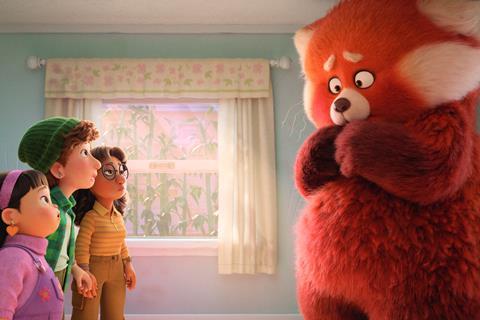Pixar turns the embarrassment of puberty into a giant red panda to show that being different is about being yourself

Dir: Domee Shi. US. 2022. 100 mins.
Puberty is a challenging time for young people, but few have it as difficult as the heroine of Turning Red, a charming family animation about an overachieving teenager who learns what happens when her emotions start to consume her. Pixar’s latest film uses the premise of a Chinese-Canadian girl who transforms into a red panda if she loses control into a deft metaphor for womanhood, accepting oneself and the pressures to conform to the tight strictures society places on us. Modest and funny, albeit occasionally a little too plot-heavy, Turning Red builds to a moving ending that speaks to the eternal tension between demanding mothers and the daughters who seek their approval.
The lively animation isn’t as overtly dazzling as in other Pixar pictures, but that’s only appropriate for a film with lower stakes and more gentle humour.
Streaming globally from March 11, this Disney animation doesn’t feature many big names among the voice cast apart from Sandra Oh in the maternal role. (Indeed, Turning Red’s starriest draw might be Billie Eilish, who cowrote the songs for the fictional boy band within the film.) But strong reviews should help boost awareness among younger audiences and their parents.
Mei (voiced by Rosalie Chiang) lives in Toronto in 2002 with her loving father Jin (Orion Lee) and domineering mother Ming (Sandra Oh), who has instilled ia perfectionist streak in her daughter. An exemplary student with a close group of friends, this 13-year-old girl is starting to become interested in boys — in particular, the dreamy members of the teen pop group 4*Town. But after Mei’s mother discovers she has crush on a local cashier, embarrassing her in public in the process, a strange metamorphosis takes place: Mei becomes so mortified that she turns into a giant red panda. Quickly determining that the transformation occurs when she loses control of her emotions, Mei must learn to keep calm, even as the date of 4*Town’s much-anticipated Toronto concert approaches.
Domee Shi, who wrote and directed the Oscar-winning animated short Bao, once again folds magical elements into a family saga for her feature debut. While Turning Red is most obviously a metaphor about the awkwardness girls face in becoming women — there’s a refreshing frankness to the film’s jokes about menstrual pads — the conceit ends up being remarkably elastic, serving as a way to discuss how people are made to feel like outsiders because they’re “different.”
In the case of Mei, who has always sought to be a model student and daughter, her frequent transformations into the red panda are an outer manifestation of her inner shame at never feeling that she’s good enough in her mother’s eyes. An embarrassed Mei will learn that these metamorphoses are, actually, part of an old curse that affects all the women in her family — and that the older generations have their own complicated relationship with the curse. Mei tries not to let her feelings overwhelm her, but what Turning Red slyly suggests is that what she’s really doing is self-consciously adhering to other people’s attitudes of how she “should” be out of fear of being demonised. (Any woman who has been criticised by men for being “too emotional” will probably sympathise with Mei’s dilemma.)
Chiang gives an endearing performance, filling Mei with all the sweetness and insecurity of a typical 13-year-old. The lively animation isn’t as overtly dazzling as in other Pixar pictures, but that’s only appropriate for a film with lower stakes and more gentle humour. Still, Turning Red is often very funny thanks to the fact that Shi lets her main character be smart and three-dimensional — the filmmaker doesn’t talk down to her adolescent audience by burdening the script with juvenile jokes.
Turning Red’s narrative thrust comes from the attempts by Mei and her friends to raise enough money for the 4*Town concert, and the early-2000s setting allows for amusing moments about now-antiquated smartphone technology and the cheesiness of boy bands. (Plus, in one of the picture’s best running gags, nobody knows why 4*Town actually has five members.)
It’s slightly disappointing that the plotting can become convoluted — and that the ending goes for razzle-dazzle spectacle out of keeping with the more human-scaled drama beforehand. But as Mei becomes more comfortable with her panda appearance — and others in her orbit do as well — Turning Red turns into a touching commentary on letting go of preconceived notions of ourselves. Eventually, we all have to transform into the creatures we were meant to be, and Shi crafts a heartfelt tribute to learning to live in our own skin — or fur, as the case may be.
Production company: Pixar
Worldwide distribution: Disney
Producer: Lindsey Collins
Screenplay: Julia Cho, Domee Shi, story by Domee Shi, Julia Cho, Sarah Streicher
Production design: Rona Liu
Editing: Nicholas C. Smith
Cinematography: Mahyar Abousaeedi, Jonathan Pytko
Music: Ludwig Goransson
Main voice cast: Rosalie Chiang, Sandra Oh, Ava Morse, Hyein Park, Maitreyi Ramakrishnan, Orion Lee, Wai Ching Ho, Tristan Allerick Chen, Lori Tan Chinn, Mia Tagano, Sherry Cola, Lillian Lim, James Hong















![[L-R]: Amanda Villavieja, Laia Casanovas, Yasmina Praderas](https://d1nslcd7m2225b.cloudfront.net/Pictures/274x183/6/4/1/1471641_pxl_20251224_103354743_618426_crop.jpg)








